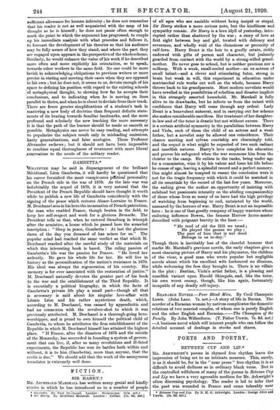FICTION.
SIR HARRY.t
MR. Aacnrsatu alinsnaaa has written many genial and kindly stories in which he has introduced us to a number of people
• Gawbetta. ny Paul De-:■-linnel. London : [13s. net.] t Sir Iliwry. By Archibald Marshall. London : Collins. 17s. 6d. net.] of all ages who are amiable without being insipid or stupid. Sir Harry strikes a more serious note, but the kindliness and sympathy remain. Sir Harry is a love idyll of yesterday, inter- rupted rather than shattered by the war ; a story of love at first sight between boy and girl, treated with delicacy and reverence, and wholly void of the clumsiness or precocity of calf-love. Harry Brent is the heir to a goodly estate, richly endowed with gifts of person and character, but jealously guarded from contact with the world by a strong-willed grand- mother. He never goes to school, but is neither precious nor a milksop. With a weak, small-souled mother—an ex-actress of small talent—and a clever and stimulating tutor, strong in brain but weak in will, this experiment in education under matriarchal rule works out well on the whole, because Harry throws back to his grandparents. Most modern novelists would have revelled in the possibilities of rebellion and disaster implicit in this strangely assorted household. Mr. Marshall is fully alive to its drawbacks, but he infects us from the outset with confidence that Harry will come through any ordeal. Lady Brent is a benevolent autocrat, and in carrying out her scheme she makes considerable sacrifices. Her treatment of her daughter- in-law and of the tutor is drastic but not without excuse. There is a certain artificial symmetry in the parallelism between Harry and Viola, each of them the child of an actress and a weak father, but a novelist may be allowed one coincidence. Their chance meeting and sylvan courtship are charmingly told, and the sequel is what might be expected of two such radiant and unselfish natures. Harry's love completes his education and proves his safeguard when the war summons him from the cloister to the camp. He enlists in the ranks, being under age for a commission, wins it by his valour and loses his life before he comes of age, leaving a splendid record and a perfect memory. One might almost be tempted to resent the conclusion were it not for the tragic frequency with which it could be matched in all its essentials by the record of the last few years. Moreover, the ending gives the author an opportunity of insisting with subdued but passionate intensity on the abiding companionship of those whose lives so many of us have had tho high privilege of watching from beginning to end, untainted by the world, unseared by the horrors of war. Harry Brent is not an impossible hero : he is one of that goodly company of happy warriors whose enduring influence Bowen, the famous Harrow house-master described with poignant brevity in the lines :— " Ile trod of old the Hill we tread ;
He played the games we play ' • The part of him that is not dead Belongs to us to-day."
Though there is inevitably less of the cheerful humour that marks Mr. Marshall's previous novels, the early chapters give a most charming picture of Harry and his playmates, the children of the vicar, a good man who wrote popular but negligible novels about which his excellent wife harboured no illusions,
while welcoming the fees they brought in. There is no villain in the plot : Bastian, Viola's artist father, is a pleasing and unselfish variant upon Harold Skimpole, and, like the tutor, his own worst enemy, though, like him again, fortunately incapable of any deadly self-injury.


































 Previous page
Previous page